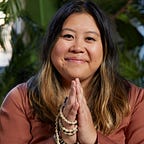Speak up. Donate. Meditate and pray for the API community.
“Thinking about you. Try to stay safe out there,” my friend had texted.
Confused by the text, I checked the local news thinking something dangerous and urgent had happened in NYC. Not seeing anything, I replied, “Huh? What happened?”
“Atlanta shooting.”
I had gotten a breaking news alert a few minutes earlier about the Atlanta shooting. Sadly, as an American, I had become desensitized and used to the stories of mass shootings. Also the headline, like so many media outlets this morning are failing to mention that this was a targeted attack against Asian women in massage parlors.
Let me reiterate that six Asian women were gunned down last night and the media is “burying the lead” as we call it in the industry.
Having spent almost the last 15 years of my life in media, I know the power of story — the capacity to ignore and amplify stories. I have also seen how only a handful of outlets have reported on the increasing number of anti-AAPI hate crimes.
Almost 4,000 anti-AAPI hate incidents have happened in the last year, according to Stop AAPI Hate. And that’s just the ones reported. They range from verbal harassment to physical assaults, all rooted in displaced blame and scapegoating for creating and spreading COVID-19 — racist and xenophobic rhetoric that became ubiquitous with our last President continuing to call it the “China virus” and “Kung Flu.” (I wrote about this right before the election last year.)
I proceeded to send the story, with a heavy heart to my family.
“Please everyone. Be safe,” I texted, with the sad knowing that none of us really were.
The violence living in our bodies
Right before I heard about the news, I had been in a BIPOC-only Buddhist study group where we focused on what sensations arise when we sense danger or safety — which in hindsight, feels like cosmic timing to equip me with the tools necessary to process the news that was came immediately after.
Exploring the intergenerational trauma that lives in my body is a journey I am just beginning as a proud daughter of Vietnamese war refugees. I often think about how much their bodies endured — my father in a POW camp, slaving away at inhumane manual labor and my mother, almost dying from starvation and tuberculosis.
I am still observing how how their pain, survival lives within me:
- My immediate tensing of my calves and shoulders when I still see Trump signs;
- The quickening of my heartbeat when I start sensing danger;
- The tightness around my chest, unconsciously cutting myself off from being able to breathe.
The question now for me is how do I live with the realities of my safety as an Asian woman while exploring my perceptions of danger? How can I truly heal if I do not feel safe?
And so as I sat on my meditation cushion this morning contemplating this paradox, I felt the anger surge through me and let my breath guide me to the wounds underneath it. I sobbed and grieved for these women, who could have easily been me.
I listened to the same prayer that helped my parents survive: Nam Mô Bồ Tát Quán Thế Âm — a call for Quan Am, also referred to Avalokiteśvara more generically, the Bodhisattva of compassion. (A Bodhisattva, in Buddhism, is someone who dedicates their lives to the liberation of others.)
According to the Vietnamese myth, she was driven to the streets by her husband who falsely accused her of endangering him, and then spent many years disguising herself as a man so she become a monastic in the nearby temple where she could seek refuge. Eventually a baby showed up at the temple’s door, claiming she was the father. Instead of revealing herself, she decided to raise this baby as her own — again outcasted. She spent the rest of her life raising this baby with love and her true identity wasn’t revealed until after she died. After her death, she was heralded and named the Bodhisattva of boundless compassion.
I am struck by her story this morning — having to hide who she was, oppressed by her gender, shunned for wanting a different life for herself, and doing everything she could to survive.
Centuries later, I cannot help but see the parallels between Quan Am and what I imagine were similar hardships that these Asian women felt during their lifetime trying to make a life for themselves — being forced to do things they didn’t want to do to simple survive. May they rest in peace. May they rest in power. May the world see the compassion that lived in them.
How to help
Speak up. If you are disgusted by this, then say it. Post about it. Don’t just let your AAPI friends have to do all the work. If last year taught us anything, there is power in the collective.
Donate to Asian-American grassroots organizations like Asian Americans Advancing Justice: Atlanta or Stop AAPI Hate.
Meditate and pray for Black, Brown, Yellow and Red bodies to be safe and to heal.
Don’t know where to meditate or process? Practice with us at GaneshSpace, where we work incredibly hard to make anyone who has felt other-ed, feel safe enough to start healing. (You can also donate to us, too.) Also check out my friend’s Steven Wakabayashi’s AAPI-only healing space.
